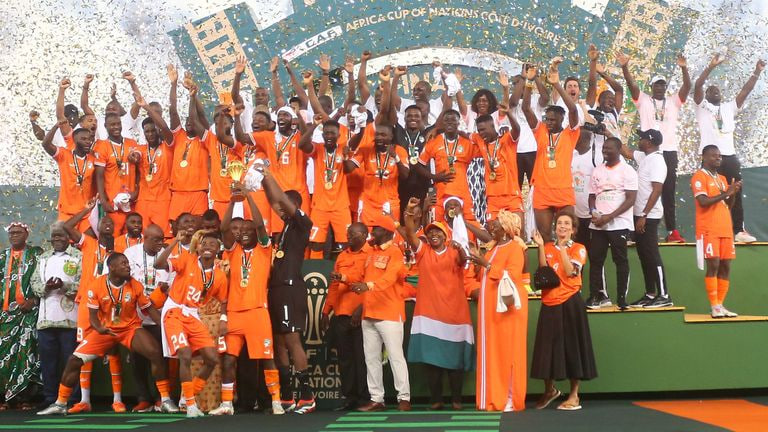Africa Cup of Nations Postponed to Early 2026 by Six Months
The Confederation of African Football (CAF) announced on Wednesday that the next Africa Cup of Nations (AFCON) finals, originally scheduled for June 2025 in Morocco, will be postponed by six months to early 2026. This decision was made to avoid a scheduling conflict with the newly expanded 32-team Club World Cup, which will be held in the United States from June 15 to July 13, 2025.
The schedule change comes as a result of overlapping commitments for many African players who are expected to participate in both tournaments. Africa will have four teams competing in the Club World Cup, and numerous players from these teams are likely to be selected for their national squads in the Cup of Nations. This overlap posed a significant challenge for CAF in terms of player welfare and tournament logistics.
CAF had been under pressure to address the clash but had not provided a resolution until now. Veron Mosengo-Omba, CAF’s general secretary, confirmed to the BBC that the AFCON finals will be rescheduled to early 2026. He acknowledged the complexities involved in the decision, particularly concerning player fatigue and travel logistics. “We can play after the Club World Cup, but is this good for the interests of the players who have played all the season and then they travel to America to play (and then) immediately come to play Afcon?” Mosengo-Omba said. “Scheduling is a nightmare for everybody.”
This postponement is a significant setback for Morocco, which had intended to leverage the summer tournament to boost its burgeoning tourism industry and demonstrate its capacity to host major international events ahead of the 2030 World Cup. Morocco is set to co-host the 2030 World Cup alongside Portugal and Spain, and the AFCON was seen as a critical opportunity to showcase its organizational capabilities.
In addition to the scheduling conflict with the Club World Cup, CAF has faced criticism for its handling of other tournament schedules. The federation has struggled to finalize dates for this year’s Women’s Africa Cup of Nations finals, also set to take place in Morocco. This delay has caused uncertainty and frustration among teams and fans alike.
Furthermore, the future of the African Football League (AFL), a new super league launched by CAF last year, remains uncertain. The inaugural edition of the AFL featured eight selected clubs competing for record prize money in a knockout format that spanned two months. CAF President Patrice Motsepe had promised that the next edition would expand to include 24 teams. However, CAF recently announced that the group stages of the African Champions League and Confederation Cup for the next season would be played from October to December, which were the same dates used for the AFL last year. This announcement has cast doubt on the scheduling and format of the upcoming AFL season.
The decision to postpone the AFCON finals and the broader challenges faced by CAF highlights the ongoing difficulties in managing a crowded and often conflicting football calendar. Balancing the interests of players, clubs, and national teams remains a complex task for football’s governing bodies.
Real-time Football scores and highlights.
Key Points:
- The Africa Cup of Nations finals originally scheduled for June 2025 in Morocco will now take place in early 2026 to avoid a clash with the Club World Cup.
- The Club World Cup, expanded to 32 teams, will be held in the U.S. from June 15 to July 13, 2025.
- African teams will have four representatives in the Club World Cup, many of whose players are also key figures for their national teams.
- CAF general secretary Veron Mosengo-Omba cited player welfare and logistical challenges as reasons for the rescheduling.
- The postponement is a setback for Morocco, which planned to use the tournament to promote tourism and demonstrate its hosting capabilities ahead of the 2030 World Cup.
- CAF has also faced criticism for delays in finalizing dates for the Women’s Africa Cup of Nations and uncertainty regarding the next edition of the African Football League.
- CAF President Patrice Motsepe had promised an expanded 24-team AFL, but conflicting schedules with other tournaments have cast doubt on this promise.
Additional Context:
- Morocco’s World Cup Aspirations: The rescheduling affects Morocco’s strategic plans to use the AFCON as a showcase event. The country is keen to demonstrate its readiness for co-hosting duties in the 2030 World Cup, for which it has high hopes alongside Portugal and Spain.
- Player Welfare Concerns: The overlapping tournaments raise significant concerns about player fatigue. African players would have faced a grueling schedule, traveling from the Club World Cup in the U.S. directly to the AFCON. This scenario could lead to potential injuries and decreased performance levels.
- CAF’s Broader Challenges: The postponement of the AFCON finals is just one of several scheduling issues facing CAF. The federation’s inability to fix dates for major tournaments has led to widespread criticism and highlights the need for better coordination and planning.
Summary of Adjustments:
- The AFCON finals are moved to early 2026.
- The Club World Cup will occupy the June 2025 slot initially intended for AFCON.
- Morocco’s plans to use AFCON as a tourism and organizational showcase are disrupted.
- Ongoing scheduling challenges for CAF, including the Women’s Africa Cup of Nations and the African Football League, remain unresolved.
Conclusion:
CAF’s decision to postpone the Africa Cup of Nations finals to early 2026 underscores the complexities of managing international football schedules. While the move aims to alleviate player fatigue and logistical issues, it poses significant challenges for Morocco and highlights broader organizational difficulties within CAF. As football continues to grow globally, effective scheduling and planning will be crucial to ensure the well-being of players and the success of major tournaments.








